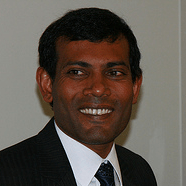Deposed President Mohamed Nasheed’s ouster was a defeat for democracy and a victory for conservative Islamism in the Maldives. But the resulting political instability in the Indian Ocean archipelago threatens to exacerbate regional rivalries in which the strategically located island nation has increasingly figured.
The apparent coup d’état on Feb. 7 was triggered by Nasheed’s move to arrest the chief justice of the Criminal Court, Abdulla Mohamed. Nasheed accused Mohamed of blocking a graft probe against Abdul Maumoon Gayoom, who ruled the Maldives for 30 years until Nasheed unseated him in the country’s first democratic election in 2008. But the story behind the transfer of power in this nation of about 330,000 Sunni Muslims is far more nuanced, as Nasheed’s removal by security forces -- allegedly fomented by Gayoom’s supporters -- came after his pro-reform policies had created a sustained clash with an opposition determined to preserve the pre-eminence of religion in public life.
During his 30 years in power, Gayoom, a graduate in Islamic jurisprudence from Egypt’s Al Azhar University, used religion to marginalize his opponents. Six months after the 2008 presidential election, Gayoom’s Dhivehi Rayyithunge Party (DRP) won a majority in Parliament and proceeded to make it difficult for Nasheed’s government to function. With even the government bureaucracy and the judiciary, long handpicked by Gayoom, refusing to cooperate, Nasheed sought to pursue his agenda using presidential powers, sometimes harshly.

